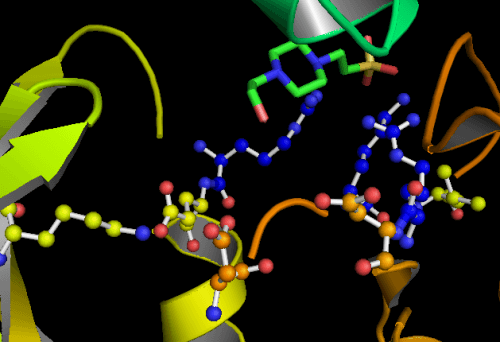Mice treated with the new substance showed significant cognitive and behavioral improvement and a reduction in the pathological symptoms of Alzheimer's disease * The study was published in November 2016 in the scientific journal Science Signaling

Researchers at Tel Aviv University have developed an innovative approach to treating Alzheimer's, which is causing echoes in the scientific world. The new method inhibits the activity of the GSK-3 enzyme - which is a major factor in a variety of neurodegenerative diseases of the brain - using substances that mimic natural target substances (substrates) of the enzyme, and manage to 'cheat' it, bind to it and neutralize it. Mice in the Alzheimer's model treated with the new substance showed a significant cognitive and behavioral improvement, along with a reduction in the pathological symptoms in the brain.
The leader of the research is Prof. Hagit Alder-Finkelman from the Department of Human Molecular Genetics and Biochemistry at the Tel Aviv University School of Medicine.
The study was published in November 2016 in the leading scientific journal Science Signaling.
promising results
"GSK-3 is a well-known enzyme that plays an essential role in various processes in the body's cells," explains Prof. Alder-Finkelman. "However, when the activity level of GSK-3 is too high, it may cause significant damage, and even death of cells. It is now known that uncontrolled GSK-3 activity is associated with a variety of degenerative diseases of the brain and central nervous system, including Alzheimer's, Parkinson's, fragile X syndrome, multiple sclerosis and more."
In light of these insights, many researchers in academia and industry have tried to develop Alzheimer's drugs by inhibiting the activity of GSK-3, but without success. The researchers in Prof. Alder-Finkelman's laboratory included the concept, and reached very promising results, including a significant improvement in the condition of laboratory mice in the Alzheimer's model.
"Until now, researchers have developed inhibitory substances that bind to the GSK-3 molecule at a site that is not specifically specific to this enzyme, but is found on the surface of the molecules of the entire protein family to which it belongs (the kinase family)," says Prof. Alder-Finkelman. "As a result, they also neutralized other molecules in the cell, causing severe side effects. In fact, these substances were defined as toxic, and did not even reach the stage of clinical trials. We, on the other hand, chose to develop specific substances that connect exclusively to GSK-3 molecules."
The GSK-3 inhibitory substances developed in recent years in Prof. Alder-Finkelman's laboratory mimic the target substances (substrates) of the enzyme - that is, specific substances, which GSK-3 was initially designed to connect with and influence within the living cell. Indeed, the researchers discovered that the GSK-3 enzyme recognizes the molecule produced in the laboratory as its target molecule, binds to it and binds to it. But now, unlike the natural target molecule, the synthesized (artificial) molecule is not released from the enzyme. In doing so, it imprisons it, and does not allow GSK-3 to continue its harmful activity.
Great potential for drug development
In their latest study, the researchers took another step forward, and significantly upgraded the inhibitory substance they developed. "The new substance, a peptide called L807mts, becomes an inhibitor only after GSK-3 binds to it," says Prof. Alder-Finkelman. "The GSK-3 enzyme recognizes the L807mts molecule as a target molecule, targets and binds to it, and performs its natural action on it - in this case phosphorylation - and it is the phosphorylation itself that turns the so-called 'innocent' target molecule into an inhibitory molecule. In this sense, GSK-3 actually produces its own inhibitory substance." Experiments with laboratory mice in an Alzheimer's model showed very promising results: the mice treated with L807mts showed cognitive improvement, improvement in social activity, and a significant decrease in the beta-amyloid deposits and inflammation that characterize your Alzheimer's brain.
"This is a completely new type of inhibitor, with some very prominent and important advantages," concludes Prof. Alder-Finkelman. "First, it is completely specific to the inhibited substance, and second, its efficiency is up to 50 times higher than that of its predecessors. It also has excellent pharmacological properties: it penetrates the tissues, is very stable in the blood and brain, and breaks down in the body as a natural substance - an essential feature when it comes to medicine. Thanks to these advantages, this is a material with great potential for drug development, for future clinical uses. In addition, we believe and hope that the new concept will also be suitable for additional proteins and other diseases."
Development of specific GSK-3 enzyme inhibitors for the treatment of insulin resistance and type 2 diabetes
Lithium may ward off Alzheimer's disease
